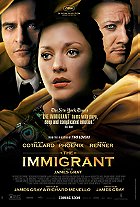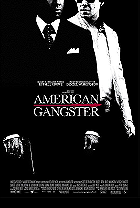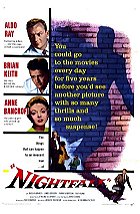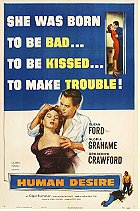James Gray’s passion play of a Polish woman discovering the American dream and its seedier realities and rot is built upon the silent era’s pantomime and impressionistic imagery and the melodramatics of the 40s and 50s. The Immigrant is a ripe film that manages to paper over its occasionally weaker moments, such as thinly written characters or an ending that feels like purple prose, through sheer force of visual poetry and Marion Cotillard’s incomparable acting skills. It’s easy to imagine a variation of this film starring Lillian Gish as the suffering dreamer caught in a love triangle and trying desperately to reunite with her sister.
The Immigrant often recalls Hollywood’s studio era in its towering artistry built around its lead actress’ performance. Cotillard suffers beautifully throughout, think of Joan Crawford expressing emotional torrent while wrapped in furs and you’re close to the filmic language of this film. She plays Ewa, freshly landed and running away from the Cossacks, an immigrant woman with a shady past that is threatened for deportation until she meets a benevolent man willing to take a chance on her. His benevolence is a mere ruse, an illusionary construction that even he half-believes, and Ewa is soon pimped out and the subject of both the character and camera’s gaze, a piercing male gaze that views her as forgiving matron and fleshy concubine.
It is Cotillard’s face and shining, haunted eyes that telegraph so much of the story’s emotional contours and interior fractures far better than the occasionally on-the-nose dialog or occurrences. She’s one of modern cinema’s strongest actors simply for her ability to behave and project with limited movement and no words volumes of detail and texture about her character. As Slant Magazine described it, she “infuses a heartbreaking mixture of dignity, vulnerability, and strength into her latest entr(y) in a gallery of ordinary women under extraordinary pressure.”
It isn’t just a shady, murky past that lingers over Ewa’s delicate frame and possessed, somber face, but the threat of losing her sister. They came over together and her tubercular sister gets quarantined, Ewa makes a promise, more like a near religious vow, to free her sister and reunite in a slice of the American ideal and promise. This is the inciting incident that makes her vulnerable for Bruno (Joaquin Phoenix) and his machinations.
Much of The Immigrant concerns her abuse and near slavery to him as he makes grandiose promises of commerce and the freedom/power it can buy. Ewa wants to free her sister, put Poland far behind her, and start anew but the past is never far enough behind us. It lurks and its traumatizing ramifications manifest in her relationship with Bruno and more sane, lucid romantic flirtations with Orlando (Jeremy Renner), a magician and Bruno’s cousin.
Orlando and his entire subplot are weak points. Not that Renner is bad in the role, no one performs at anything less than optimally throughout, but it’s thinly written material when it comes to him. Ewa becomes less of an agent of her own life, there’s plenty of material suggesting that she sees her relationship with Bruno as justifiable punishment for misdeeds and the cosmos teaching her forgiveness, and more of a pawn between the two men. An early scene where he entertains the detainees on Ellis Island and promises the American dream is laughably on the nose when so much of the film is painterly compositions and articulated through elision.
 Login
Login
 Home
Home 95 Lists
95 Lists 1531 Reviews
1531 Reviews Collections
Collections
 0 comments,
0 comments, 







